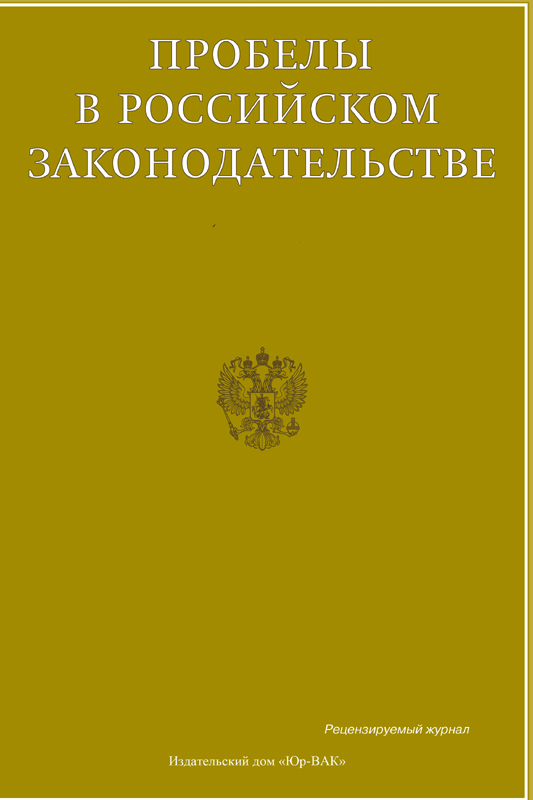Technology and Law: to the Formulation of the Problem
- Авторлар: Samushkin N.D.1
-
Мекемелер:
- Kutafin Moscow State Law University (MSAL)
- Шығарылым: Том 16, № 2 (2023)
- Беттер: 36-41
- Бөлім: Theoretical and Historical Legal Sciences
- URL: https://journals.eco-vector.com/2072-3164/article/view/568681
- ID: 568681
Дәйексөз келтіру
Аннотация
The technological revolution and its social consequences are currently being studied mainly in the paradigm of philosophy, history, and sociology. However, legal science has not yet developed a systematic view of the significance, problems and prospects of the impact of the technological development of society on the processes of legal regulation of social relations, the impact of the technological revolution on legal consciousness, the legal system, the structural elements of law, as a result of which, for this branch of scientific knowledge, the problem of technological revolution retains novelty.
The purpose of this article is to study the technological revolution as a phenomenon that has a direct impact on the development of law, to analyze the causes, consequences, essence and progressive aspects of the technological revolution. Based on the results of the study, the author concludes that at the present stage, the technological revolution, having an all-encompassing effect on legal institutions, is the leading law-forming factor, and in the context of legal science, this phenomenon can be the subject of legal research.
Толық мәтін
Авторлар туралы
Nikita Samushkin
Kutafin Moscow State Law University (MSAL)
Хат алмасуға жауапты Автор.
Email: nikitasam99@gmail.com
ORCID iD: 0009-0002-8220-9926
SPIN-код: 5537-5825
postgraduate student of the Department of Theory of State and Law
Ресей, MoscowӘдебиет тізімі
- Kara-Murza S. Crisis social Studies. M., 2011. P. 25.
- Komissarova E.G. Formal and logical aspects of the concept of «legal nature» // Bulletin of Perm University. - 2012. - №. 2. – pp. 23-29.
- Problems of transformation of the system of legislation in the context of the development of digital technologies: monograph / under the scientific editorship of A.V. Kornev. – Moscow: Prospekt, 2021. – p. 26.
- Kornev A.V. Technological revolutions and law // History of the state and law. – 2019. – No. 5. – p. 5.
- Kornev A.V. Normativity of Law and Normativism in Law: Theoretical and Practical Perspectives of Separate Law Schools // Journal of Russian Law. 2020. No. 12. pp. 5-20.
- Kudrin B.I. Technique: a new paradigm of the philosophy of technology (the third scientific picture of the world) (Preprint). – Tomsk, 1993. – p. 31.
- Ladenkov E.V. The influence of technological revolutions on law // Philosophy of Law. – 2022. - № 1(100). - P. 47.
- Lukasheva E.A. Human rights: textbook for universities. – M.: Norm, 2004. – P. 137.
- Moiseev E.G. Society and man. M.: Prospect, 2017. P. 13.
- Morozova L.A. Theory of State and law. – M.: Prospect, 2012. – p. 210.
- Nikiforov A.L. Philosophy of Science: History and theory (textbook). – M.: Idea – Press, 2010. - p. 91.
- Ozhegov S. I., Shvedova N. Y. Explanatory dictionary of the Russian language. Moscow, 2011. p. 2287.
- Rachkov V.P. Technology and its role in the fate of mankind. – Sverdlovsk, 1991. – p. 288.
- Sinyukov V.N. Digital law and problems of stage-by-stage transformation of the Russian legal system // Lex Russica. – 2019. - № 9 (154). P. – 11.
- Stepin V.S. History and philosophy of science. M., 2014. p. 139.
- Chetvernin V. A. Introduction to the course of general theory of state and law. General part : studies. manual. M., 2003. p. 151.
- Schwab K. Technologies of the Fourth Industrial Revolution. Moscow, 2018. p. 14.
Қосымша файлдар








